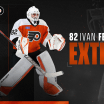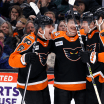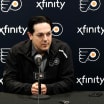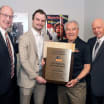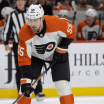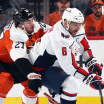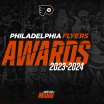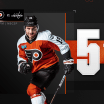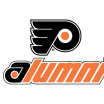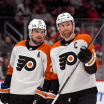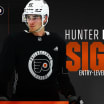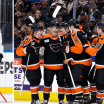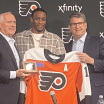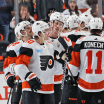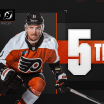Established in 1988, the Flyers Hall of Fame honors players, coaches, executives, and builders who have significantly contributed to the franchise's success. Twenty-five honorees have been inducted. The Flyers Hall has been inactive since the 2016 passing of team co-founder and longtime chairman Ed Snider. At some future point, however, there could be new inductions.
The current list of inductees is as follows: Bobby Clarke (1988), Bernie Parent (1988), Keith Allen (1989), Bill Barber (1989), Ed Snider (1989), Rick MacLeish (1990), Fred Shero (1990), Barry Ashbee (1991), Gary Dornhoefer (1991), Gene Hart (1992), Reggie Leach (1992), Joe Scott (1993), Ed van Impe (1993), Tim Kerr (1994), Joe Watson (1996), Brian Propp (1999), Mark Howe (2001), Dave Poulin (2004), Ron Hextall (2008), Dave Schultz (2009), John LeClair (2014), Eric Lindros (2014), Eric Desjardins (2015), Rod Brind'Amour (2015), and Jim Watson (2016).
Flyers Hall of Fame: Future Candidates Abound
Among Flyers Alumni, here are some of the leading candidates for future Flyers Hall of Fame induction
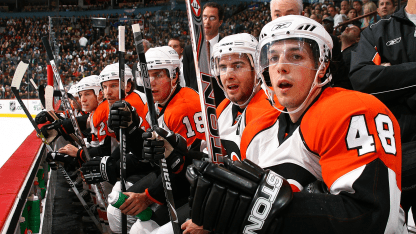
Next week on Flyers Daily, host Jason Myrtetus and Flyers content contributor Bill Meltzer will interview several current and prospective Flyers Hall of Famers about their careers in the orange and black.
Among current Flyers players, Claude Giroux stands the strongest chance for for eventual selection to the Flyers Hall of Fame. He stands a good chance of finishing second in franchise history in total points and is already the longest-reigning captain in franchise history (Clarke had two separate captaincy stints, interrupted by the late 1970s/early 1980s period when he was an assistant coach to Pat Quinn in addition to being an active player on the roster and the captaincy was held by Mel Bridgman and then by Barber). It is also possible that Sean Couturier and/or Jakub Voracek could continue to build cases for including
Among Flyers Alumni, here are some of the leading candidates for future Flyers Hall of Fame induction:
Simon Gagne (LW)
A first-round Draft pick in 1998, Gagne later had back-to-back seasons with more than 40 goals (47 in 2005-06 and 41 in 2006-07), four seasons with 33 or more goals, was a two-time winner of the Bobby Clarke Trophy as Flyers team MVP, and participated in two NHL All-Star Games and the Olympics during his Flyers career. Gagne was part of the 2009-10 team that reached the Stanley Cup Final and two teams (1999-2000 and 2003-04) that came within a single win of trips to the Cup Final.
Gagne also scored three of the most important playoff goals in the last 20 years of team history. It was Gagne who scored the OT goal in Game 6 of the 2004 Eastern Conference Final that forced a deciding 7th game in Tampa Bay. In 2010, returning from injury at far less than 100 percent, Gagne scored the OT goal against Boston in Game 4 of the Eastern Conference semifinals that prevented a sweep and, in Game 7, scored the game-winning power play goal that completed Philly's historic comeback from 3-0 deficits both in the series and in the final game.
Overall, Gagne is 12th in Flyers franchise history in points (535 in 691 games), ninth in goals (264, with all eight players above him already in the team HOF), 13th in power play points (171), ninth in shorthanded points (23), and tied for 17th in cumulative plus-minus (+140). He is 11th in regular season games played. Primarily a left winger during his NHL career, Gagne was drafted as a center and played center early in his rookie season (1999-2000) before being moved to wing.
Mark Recchi (RW/LW): The Hockey Hall of Fame forward played more games over his two stints with the Flyers (602) than he did with any of his other teams, including Pittsburgh (389) or Montreal (346). Recchi still holds the franchise single-season point record (123 in 1992-93), had back-to-back 100-point seasons (1992-93 and 1993-94), three Flyers seasons with 90-plus points and five with 75-plus points.
Along with Rick MacLeish and Bill Barber, he's one of three members of the dual 50-goal, 100-point club in a season. All-time, Recchi in 9th in franchise history in points (627 in 602 games), tied with Rick Tocchet for 12th in goals (232), ninth in total points and sixth in power play points (230). Recchi played either wing with equal comfort (although more right wing than left) and even had stints at center as needed. He was chosen to the NHL All-Star 2nd Team at RW in 1992-93, was a three-time Bobby Clarke Trophy winner (1992-93, 1999-2000, 2003-04) and played in three NHL All-Star Games as a Flyer.
Before Recchi's first Flyers stint ended with an historic trade to Montreal that brought John LeClair, Eric Desjardins and Gilbert Dionne to Philadelphia, he was one-third of the "Crazy Eights" line with Eric Lindros and Brent Fedyk.
The line's accomplishments, during the five-year dark period when the Flyers did not reach the playoffs, were overshadowed by the subsequent emergence of the Legion of Doom (Leclair, Lindros and Mikael Renberg) but was very potent in its own right. Ditto the frequent line of a rookie Renberg (often on left wing that season) with Lindros and Recchi in 1993-94.
Rick Tocchet (RW)
Tocchet was recently inducted into the Philadelphia Sports Hall of Fame. The hard-working, pugnacious power forward started out as a third-line and fourth-line player and worked his way up in the lineup. A three-time NHL All-Star Game participant as a Flyer, "Tocch" won the Bobby Clarke Trophy in 1989-90. He had four straight seasons with 30-plus goals including 45-goal (1988-89) and 40-goal (1990-91) campaigns. Tocchet had a pair of four-goal games as a Flyers among eight hat tricks. He even led the team in assists during the 1989-90 season (59). He's the Flyers all-time penalty minute leader (1,815) and also tied with Recchi for 12th in goals (232) along with being 15th in points (508).
Tocchet was part of Flyers teams that reached two Stanley Cup Finals (1984-85 as a rookie and 1986-87), a Wales Conference Final (1988-89) and, during his second stint, an Eastern Conference Final (1999-2000).
Kimmo Timonen (D)
The five-time Barry Ashbee Trophy winner was a universally respected team leader during his seven-plus seasons with the Flyers. Timonen was a vital part of the team's instant turn-around from the franchise-worst 2006-07 season, and was a key player on an Eastern Conference finalist in 2007-08 and Stanley Cup Finalist in 2009-10.
Small in height but fearless and deceptively strong with a thick frame and low center of gravity, Timonen's level of stoic pain tolerance was legendary even by hockey standards. His 519 games played rank 10th among Flyers defensemen and his 270 points rank third.
Danny Briere (C/W)
Briere's playoff heroics are the key to his candidacy. He is fourth in playoff points-per-game (1.06) in franchise history and sixth in total points (72) in the postseason. Additionally, he produced a pair of 30-goal regular seasons and played in the NHL All-Star Game in 2010-11. Off the ice, he is one of the most beloved players in recent franchise history and universally respected among former teammates.
Scott Hartnell (LW)
Hartnell was the left winger on three highly successful Flyers line combos with notably different forms of chemistry: first with Jeff Carter and Joffrey Lupul, then with Briere and Ville Leino and finally with Giroux and Jaromir Jagr. Hartnell had a pair of 30-goal seasons as a Flyer and five with 20 or more goals. An NHL All-Star in 2011-12, Hartnell brought pugnacity on the ice and a laid-back sense of humor off the ice.
Along with Briere and Timonen, his acquisition was a vital part of the Flyers' instant turnaround from being the NHL's worst team the year before their arrival to a team that played in an Eastern Conference Final and a Stanley Cup Final in addition to posting 106-point (2010-11) and 103-point (2011-12) seasons and took out the favored Penguins in the first round of the 2012 playoffs.
Paul Holmgren (RW, coach, GM, executive)
The fact that "Homer" is the only person in franchise history to serve the organization as a player, assistant coach, head coach, scout, assistant general manager, general manager, and team president makes him a prime candidate for induction. His credentials include:
* As a player: He produced a 30-goal season and Stanley Cup Final hat trick (becoming the first American player in NHL history to do so) in 1979-80 as a member of the Rat Patrol line with Brian Propp and Ken Linseman; 2nd in franchise history with 1,600 penalty minutes; 35th in games played (500). Holmgren also played in the NHL All-Star Game in 1980-81.
* As head coach: Holmgren was the head coach during the Flyers' surprise run to Game 6 of the 1989 Wales Conference Final, including an upset of Pittsburgh. Previously, Holmgren served as an assistant coach under Mike Keenan, and part of the 1986-87 staff on a team than fell just one win shy of the Stanley Cup championship.
* As Director of Player Personnel and then Assistant GM: General manager Bob Clarke delegated oversight of scouting and drafting operations to Holmgren, who also served as the de facto general manager of the Philadelphia Phantoms. Holmgren was an important figure in building the two Phantoms Calder Cup championship winning rosters (1997-98, 2004-05). He was also deeply involved in the decision process for the drafting of Justin Williams in 2000, Jeff Carter and Mike Richards in 2003 and Claude Giroux in 2006.
* As general manager: Holmgren took over from Clarke as general manager during the worst season in franchise history (2006-07). One season later, the team reached the Eastern Conference Final. After a 99-point season in 2008-09, the Flyers reached an overtime Game 6 of the Stanley Cup Final in 2009-10. In 2010-11, the Flyers posted 106 points (their highest output of the 2000s). In 2011-12, the team had 103 points in the regular season and then upset the favored Penguins in the first round. The team had a bad year in the lockout-shortened 2012-13 season and then, after an awful start, rebounded to reach the playoffs and take the New York Rangers to a 2-1 Game 7 in the Eastern Conference quarterfinals. Thereafter, he turned over the GM reigns to Ron Hextall, as the franchise embarked on a farm system restock.
* Behind the scenes: Holmgren neither seeks nor wants any publicity for the many ways through the years that he's helped people (including but hardly limited to players and Alumni) who need opportunities or second-chances in their professional and personal lives. It's his way of paying forward what he received in his own life. Apart from Ed Snider himself, there has perhaps been no person who has quietly helped more people behind the scenes -- and fought harder to preserve the "family" identity of the organization -- than Paul Holmgren.
DARK HORSE CANDIDATES
Mike Richards (Center)
A heart-and-soul competitor at the height of his powers, Richards was a classic overachiever for most of his Flyers career. Richards produced a pair of 30-goal seasons, an 80-point campaign in 2008-09, three seasons with 40 or more assists and captained the 2009-10 squad that came within two wins of the Stanley Cup.
Brad McCrimmon (Defenseman)
The right defense half of the most dominant blue line pairing in franchise history, "the Beast" won the Barry Ashbee Trophy during the team's breakout 1984-85 season. The next year, partner Mark Howe posted a +85 rating (a franchise record) to McCrimmon's +83 while the rest of the defense corps was either at even (Brad Marsh) or minus-rated (everyone else) for the season. Although McCrimmon was better known as a hard-nosed shutdown defenseman, he could burn an opponent who paid too much attention to Howe's side of the ice. Twice, McCrimmon potted double-digit goals and he also topped the 40-point mark twice.
Simon Nolet (Right Wing, Scout)
A sleeper candidate, Nolet played for the Flyers from 1967-68 through the first Stanley Cup season (1973-74). He was an NHL All-Star in 1971-72, From 1990 until his retirement in 2018, Nolet was a mainstay on the Flyers' scouting staff under Russ Farwell, Clarke, Holmgren and Hextall.
As a Flyers Quebec-based scout, Nolet had the most viewings of Simon Gagne leading up the 1998 Draft and Claude Giroux leading up to 2005-06. He was also the scout who pushed for the selection of University of Vermont forward Patrick Sharp in the third round of the 2001 Draft. In total, Nolet proudly served the Flyers organization for roughly 35 years between his playing and scouting careers.
Bob "the Hound" Kelly (Left Wing, Ambassador of Hockey)
As a player, Kelly provided instant energy, toughness and an indomitable competitive spirit that enabled him to bypass minor league hockey and spend his entire pro career in the NHL. "The Hound" was better known for his tenacious physical style but scored the Stanley Cup winning goal in 1975 and even posted a pair of 20-goal seasons under head coach Fred Shero. In his post-career roles as Ambassador of Hockey and in community relations functions, no one in the organization has done more to promote the sport or logged more miles in fosters enthusiasm for the Flyers brand throughout the Delaware Valley than Kelly.
Bob "the Count" Dailey (Defense)
A two-time winner of the Barry Ashbee Trophy as the Flyers' best defenseman, the late Dailey possessed a rare combination of imposing size (6-foot-5, 220 pounds), a rocket of a slap shot and an occasional mean streak that also carried him to a pair of NHL All-Star Game selections as a Flyer. During the prime of his career, "the Count" was among the best offense-contributing defensemen in franchise history.
During his Flyers career, Dailey averaged two points for every three games played and recorded a 21-goal season during his first full year in the orange and black. It was in the 1980 playoffs, however, where Dailey showed his true worth to the Flyers. The big blueliner was a crucial cog in the Flyers' run to the Stanley Cup Finals. Despite needing shoulder surgery, he racked up 17 points in 19 games and played some of the best all-around hockey of his career. Unfortunately, a serious ankle injury prematurely ended Dailey's career at age 29.
Andre "Moose" Dupont (Defense)
The creator of the "Moose Shuffle" goal celebration and two-time Stanley Cup winner was a tough-as-nails member of the Broad Street Bullies. He won the Barry Ashbee Trophy in 1976-77 and played in the 1976 NHL All-Star Game at the Spectrum. Over his eight seasons as a Flyer, Dupont racked up 1,505 penalty minutes, 177 points and a cumulative +269 rating in 539 regular season games. He also dressed in 108 playoff games.
Pelle Eklund (Center/ Left Wing)
Eklund was one of the most gifted skaters and playmakers to play for the Philadelphia Flyers. He won the Bobby Clarke Trophy as the Flyers' most valuable player during the 1990-91 season. The speedy Swede reached to 50-assist milestone three times during his Philadelphia career and topped 40 assists four times. He'd have reached those marks even more frequently if not for numerous injuries, which prevented him from playing more than 55 games in any Flyers' season after 1990-91.
For his Flyers' career, Eklund had 452 points (118 goals, 334 assists) in 589 regular season games. He produced 43 points (10 goals, 33 assists) in 57 playoff games, highlighted by his heroics in the 1987 postseason in general and the Stanley Cup semifinals against the Montreal Canadiens in particular when he racked up five goals and seven points.
Ilkka Sinisalo (Right Wing)
Opponents overlooked Sinisalo's talents at their own peril. It was for good reason the Spectrum's famous Sign Man, Dave Leonardi, dubbed the player "Ilkka Score-a-goal-a." The smooth-skating Finn was one of the Flyers' unsung heroes of the 1980s; a steady, reliable performer who could be used in all game situations. While most of the accolades went to players like Brian Propp, Tim Kerr, Rick Tocchet, Peter Zezel and playmaking center Pelle Eklund, Sinisalo was quietly one of the club's most consistent performers for nine solid seasons.
Overall, he produced 408 points in 526 regular season games as a Flyer, including back-to-back seasons (1984-85 and 1985-86) in which Sinisalo averaged north of one point per game.
Mikael Renberg (Right Wing, Left Wing)
Best known for his role as one-third of the Legion of Doom line, established one season after he set a still-standing franchise rookie scoring record (38 goals, 82 points in 1993-94), Renberg's two stint Flyers career could be broken down into two phases.
After a brilliant start in his first two-and-a-half seasons in the NHL (87 goals and 182 points in his first 175 games), a series of major injuries lessened the winger's effectiveness. When healthy, he was every bit as important -- both offensively and as a two-way player -- to his line's success as his linemates.
Murray Craven (Left Wing, Center)
The perenially underrated Craven enjoyed two seasons with 75-plus points during his Flyers career while playing a highly intelligent brand of all-around hockey. His best offensive season came in 1987-88 when he notched 30 goals and 76 points in 1987-88.
Head Coaches
Mike Keenan is probably the lead candidate among those who have not been inducted, but the late Pat Quinn and Terry Murray also merit consideration. Meanwhile, Peter Laviolette is 3rd in franchise regular season coaching wins with 145 and had a trip to the 2010 Stanley Cup Final and 23 overall postseason wins on his resume as well.
Lou Nolan (Public Adress Announcer)
Nolan has worked with the Flyers in different capacities since the time of the team's foundation in 1967, but is best known as the home arena public address announcer from the time of the Stanley Cup years of the "Broad Street Bullies" right up to the present day.
A "microphone" banner for Nolan, similar to the one that adorns the Wells Fargo Center rafters for legendary Philadephia 76ers PA announcer Dave Zinkoff, would not be out of place for the man who announced "Flyers goal scored by..." for the vast majority of the names in the team's Hall of Fame.

